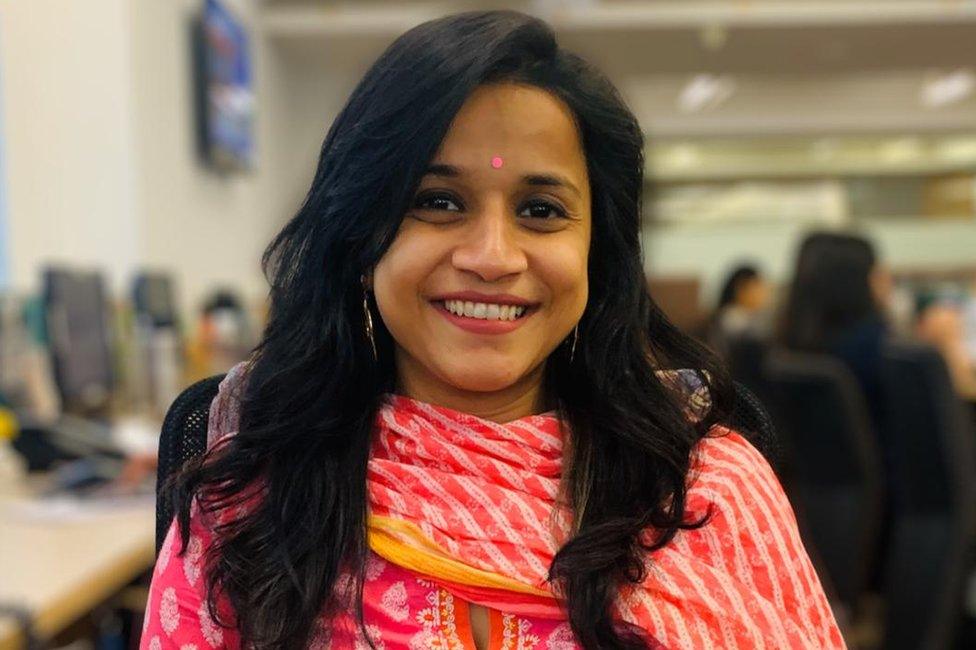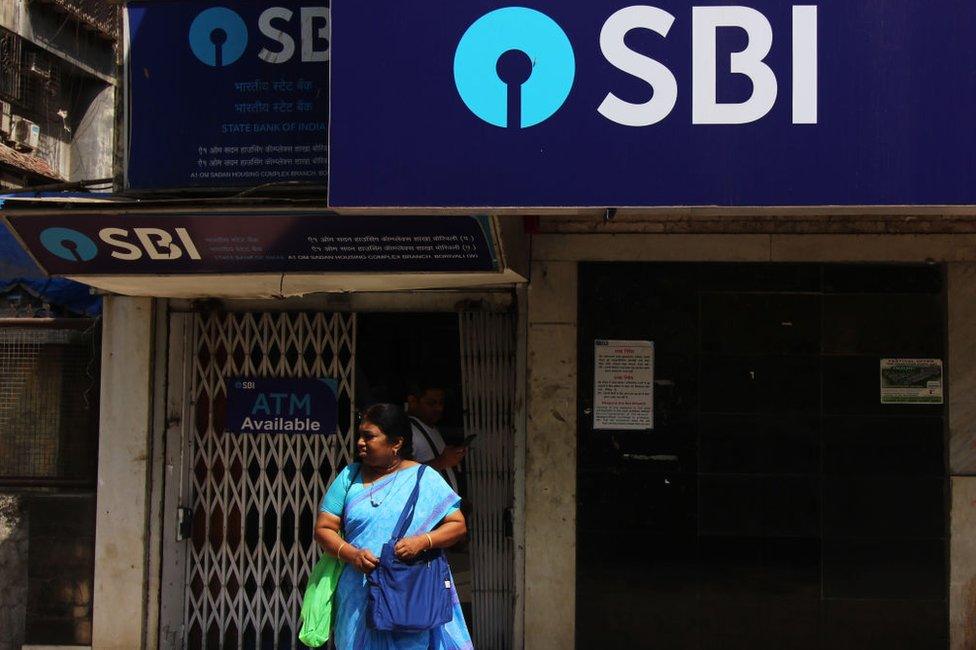Coronavirus lockdown sees share of women on India's stock market rise
- Published

More and more Indian women have turned to the stock market during the pandemic to bolster their savings, reports the BBC's Nidhi Rai in Mumbai.
Sakina Gandhi has found a new passion: stock market trading.
The 31-year-old works in public relations and until this year had only invested in mutual funds, generally seen as a safer bet than directly trading in stocks.
But when India went into a stringent lockdown in March to prevent the spread of Covid-19, Ms Gandhi found herself with a lot of time on her hands.
"I had time to look at the market," she says. "The first 15 days I only tracked the market. I made a list of stocks and analysed what kind of volatility they were showing. After consulting a few colleagues, I bought those stocks."
It proved to be a lucrative option.

Sakina Gandhi began investing in stocks during the lockdown
Share prices plunged amid fears over the virus and stayed low as the lockdown battered the Indian economy. But they soon picked up as investor sentiment rallied. Trusted stocks braved the storm and some company valuations have since grown substantially. Prices remain at a high, buoyed by falling Covid case numbers and the promise of a vaccine.
This is despite heavy job losses, negative growth and other macro factors that have left the Indian economy reeling.
A surge in investors
But that's also why working women such as Ms Gandhi are looking to make some extra money. And she is not alone.
"There is a definite rise in new women investors," says Nikhil Kamath, co-founder of Zerodha, a stockbroking company.
Of the more than 1.5 million clients the firm has added since the outbreak of Covid-19 in India earlier this year, some 235,000 are women. That's about half of their women investors, whose average age is 33 years, Mr Kamath says.
Another stockbroking firm, FYERS Securities, told the BBC it has seen a three-fold rise in active women traders.
This fits with the larger trend in India that appears to have been wrought by the pandemic - a surge in demat accounts, an electronic facility for passing virtual share certificates between investors.
Some 6.3 million new demat accounts were opened in India between April and September this year, according to market regulator SEBI (Securities and Exchange Board of India). This is more than double of last year's tally for the same period (2.7 million).
And many of these investors are young women, says stockbroking firms.

Indian women typically park their savings in fixed deposit in banks
Why now?
Ritika Shah, 36, comes from a family that has long invested in the stock market but she had never done so - until this year.
"I was waiting for the right time to do it. The pandemic gave me time to plan my finances. I got time to research, study and follow up," she said.
Mr Khoday says women are typically more "inclined to invest than trade". That is, they buy traditional assets such as gold or park money in safe place such as fixed deposits and, more recently, tax-saving mutual funds.

India's stringent lockdown bettered the economy
The lockdown also turned out to be a good time to enter the market. Ms Shah, for instance, says the valuation for the market in March was a deciding factor.
Mr Kamat says fixed deposits, although safe, became less attractive and mutual funds dropped too, encouraging people to start investing directly in stocks. So, he adds, people's attention turned to capital markets because of the "heavily discounted valuations of fundamentally strong large-capital companies".
The surge has also been aided by technology and simplified processes.
Cheap data allowed investors to stay hooked to the stock market; and online banking and trading quickened buying and selling. Many broking firms are charging almost no fees, enticing new investors. Firms have also begun educating investors about the stock market and have seen an uptick in visits to their website.
Meet Deena Mehta, India's first female stockbroker
The biggest encouragement came from market regulator SEBI, which eased the process of opening a demat account. It also allowed the e-signatures and digital lockers so paperwork can be processed fast and from within the confines of home during the pandemic.
And those who decided to give it a shot have even begun to enjoy it. Ms Gandhi says she tracks stocks in the newspaper daily and has also set up Google alerts for news of companies that interest her.
"It's my money" she says. "My husband or anyone has no say in it. Therefore I thought why not take some risk and see what happens. It actually turned out to be good."
- Published1 August 2020
